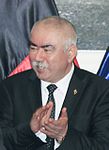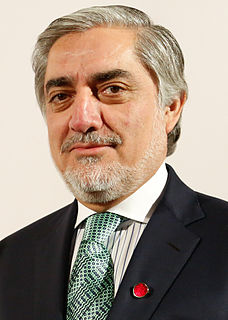
The politics of Afghanistan consists of the council of ministers, provincial governors and the national assembly, with a president serving as the head of state and commander-in-chief of the Afghan Armed Forces. The nation is currently led by President Ashraf Ghani who is backed by two vice presidents, Abdul Rashid Dostum and Sarwar Danish. In the last decade the politics of Afghanistan have been influenced by NATO countries, particularly the United States, in an effort to stabilise and democratise the country. In 2004, the nation's new constitution was adopted and an executive president was elected. The following year a general election to choose parliamentarians took place.
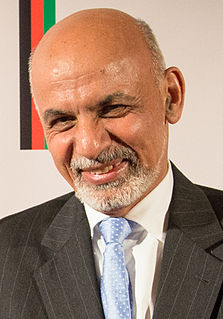
Mohammad Ashraf Ghanī Ahmadzai ; born 19 May 1949 as the son of Shah Jan in Logar, is an Afghan politician and current President of Afghanistan, elected on 21 September 2014. An anthropologist by education, he previously served as finance minister and the chancellor of Kabul University.

An election to the office of President of Afghanistan was held on October 9, 2004. Hamid Karzai won the election with 55.4% of the votes and three times more votes than any other candidate. Twelve candidates received less than 1% of the vote. It is estimated that more than three-quarters of Afghanistan's nearly 12 million registered voters cast ballots. The election was overseen by the Joint Electoral Management Body, chaired by Zakim Shah and vice-chaired by Ray Kennedy, an American working for the United Nations.

The United Nations Assistance Mission in Afghanistan (UNAMA) is a political UN mission established at the request of the Government of Afghanistan to assist it and the people of Afghanistan in laying the foundations for sustainable peace and development. UNAMA was established on 28 March 2002 by United Nations Security Council Resolution 1401. Its original mandate was to support the Bonn Agreement. Reviewed annually, this mandate has been altered over time to reflect the needs of the country and was extended for another year on 8 March 2018 by Resolution 2405 (2018).

This article gives information on elections in Afghanistan.
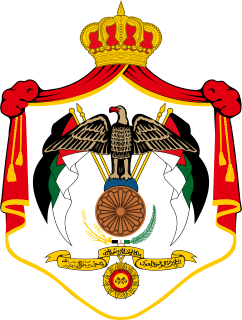
Elections in Jordan are for the lower house, known as the House of Representatives, of the bicameral parliament of Jordan, as well as for local elections. They take place within a political system where the King has extensive legislative and executive powers, retaining ultimate political control. The Prime Minister is selected by the King, the PM is then free to choose his own Cabinet. The parliament has quotas: three seats for Circassians and Chechens, nine for Christians and fifteen for women. The electoral system favours rural tribes and those of East Bank origin over urban areas that are primarily inhabited by those of Palestinian descent.

Afghanistan held parliamentary and provincial council elections on 18 September 2005. The first results were declared on 9 October, with final results being delayed by accusations of fraud, and were finally announced on 12 November.
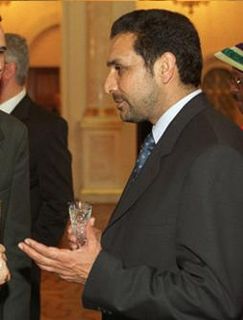
Ahmad Zia Massoud was the Vice President of Afghanistan in the first elected administration of President Hamid Karzai, from December 2004 to November 2009. He is a younger brother of the late Ahmad Shah Massoud, the resistance leader against the Soviet invasion of Afghanistan and against the Taliban. In late 2011, Ahmad Zia Massoud joined hands with major leaders in the National Front of Afghanistan, which strongly opposes a return of the Taliban to power. The National Front is generally regarded as a reformation of the United Front which with U.S. air support removed the Taliban from power in late 2001.

Presidential elections were held in Afghanistan on 20 August 2009. The election resulted in victory for incumbent Hamid Karzai, who won 49.67% of the vote, while his main rival Abdullah Abdullah finished second with 30.59% of the vote.

The Afghan parliamentary election, 2010 to elect members of the House of the People took place on 18 September 2010. The Afghan Independent Election Commission - established in accordance with the article 156 of the Constitution of Afghanistan for the purpose of organizing and supervising all elections in the country - postponed the poll from its original date of 22 May to September 18.

There are six types of elections in the United Kingdom: elections to the House of Commons of the United Kingdom, elections to devolved parliaments and assemblies, elections to the European Parliament, local elections, mayoral elections and Police and Crime Commissioner elections. Within each of those categories, there may be by-elections as well as general elections. Elections are held on Election Day, which is conventionally a Thursday. Since the passing of the Fixed-term Parliaments Act 2011 for general elections, all six types of elections are held after fixed periods, though early elections to parliament and the devolved assemblies and parliaments can occur in certain situations. Currently, six electoral systems are used: the single member plurality system, the multi member plurality system, party-list proportional representation, the single transferable vote, the additional member system and the supplementary vote.

A voter ID law is a law that requires a person to show some form of identification on election day. In many jurisdictions requiring voter IDs, voters who do not have photo ID often must sign a Challenged Voter Affidavit in order to receive a ballot to vote. Because of perceptions of a differing means to obtain identification on the basis of socioeconomic status, age, or race, some people consider these laws as controversial.

A parliamentary election was held in the Gambia on 29 March 2012. The election was for 48 of 53 seats in the unicameral National Assembly, with five seats being appointed by the president.

Presidential elections were held in Afghanistan on 5 April 2014, with a second round held on 14 June. Incumbent President Hamid Karzai was not eligible to run due to term limits. The registration period for presidential nominations was open from 16 September 2013 until 6 October 2013. A total of 27 candidates were confirmed to be running for office. However, on 22 October Afghanistan’s Independent Election Commission disqualified 16 of the candidates, leaving only 11 in the race. By April 2014 three candidates gave up the race and decided to support some of the eight remaining candidates. Opinion polls showed Abdullah Abdullah and Ashraf Ghani as the front-runners and indeed the results of the first round election had Abdullah in the lead and Ghani behind him. The second set of results came after the run-off on 14 June, two months after the first round. Preliminary results were expected on 2 July and the final result on 22 July. However, widespread accusations of fraud delayed these results. In September 2014, the Independent Election Commission named Ashraf Ghani the winner.
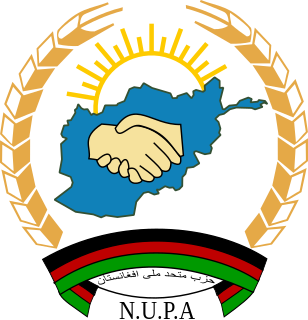
The National United Party of Afghanistan is a major left-wing political party in Afghanistan.
The following lists events from 2014 in Afghanistan.

General elections were held in Jordan on 20 September 2016 to elect the 18th House of Representatives. The elections were announced after parliament was dissolved by King Abdullah II on 29 May 2016, with the King appointing Hani Mulki as interim Prime Minister following the resignation of Abdullah Ensour.

Presidential elections will be held in Afghanistan in 2019. It was announced on December 26, 2018 that the Independent Election Commission (IEC) would postpone the next Presidential election from April 20 to July 20, 2019 in order to fix problems that became apparent during the October 2018 parliamentary elections. The additional time will be used to verify voter lists and train election workers on the new biometric identification system.

On 21 January 2019, in central Afghanistan, the Taliban attacked a military compound in Maidan Shar, killing officers of the Afghan National Directorate of Security. The Taliban attacked while engaging in the process of negotiating a truce with the United States. The attack began when an explosives-laden car rammed through a military checkpoint and onto the grounds of the compound, where the vehicle detonated. After the explosion, two gunmen entered the base and opened fire on Afghan soldiers, before the two were shot down. A senior official in the Afghan defense ministry said that 126 people were killed in the explosion. The Taliban claimed responsibility and stated that over 190 people were killed in the attack. The Afghan National Directorate of Security (NDS) reported that 36 military personnel were killed in the attack. Afghan president, Ashraf Ghani condemned the attack and said that the 'Afghan intelligence agency personnel were target of the attack'.





